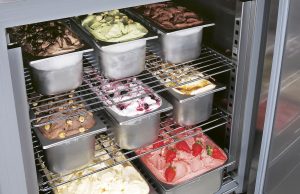In the world of baking and pizzerias, spiral mixers play a fundamental role, especially when working with high-hydration doughs. These doughs, characterized by a high percentage of water relative to the flour, require specific tools to ensure optimal results. In this article, we will explore spiral mixers in detail, explaining how they work and their importance, and we will touch upon the hydration of classic pizza, contemporary pizza, and Neapolitan pizza.
1. Introduction to Spiral Mixers
Spiral mixers are machines designed to mix and knead large quantities of flour and water efficiently and uniformly. Their structure features a spiral arm that rotates within a bowl, creating continuous movement that incorporates air and develops the dough’s structure. This type of mixer is particularly suitable for high-hydration doughs, which can be challenging to handle using traditional methods.
2. The Importance of Dough Hydration
Dough hydration refers to the amount of water present relative to the flour, expressed as a percentage. High hydration (above 70%) gives the dough greater lightness, open crumb structure, and digestibility. However, handling these doughs requires good technique and appropriate equipment.
Hydration of Classic Pizza
Italian classic pizza, often associated with round, plate-served pizza, typically has hydration levels between 55% and 65%. This type of dough is relatively easy to work with and stretch, resulting in a crispy exterior and a soft interior. Spiral mixers can enhance the texture and workability of these doughs, ensuring homogeneous mixing and good air incorporation.
Hydration of Contemporary Pizza
Contemporary pizza, such as pizza al taglio (by the slice) or pizza alla pala (baked on a shovel), is known for its lightness and pronounced crumb structure. These doughs can have hydration levels exceeding 70%, sometimes reaching 80% or more. Spiral mixers are essential for handling these highly hydrated doughs as they ensure effective mixing and excellent final structure. High hydration gives the pizza a crispy crust and a soft, airy interior, making it particularly appreciated.
Hydration of Neapolitan Pizza
Neapolitan pizza is famous for its tall, puffy crust with a thin, soft center. The dough’s hydration typically ranges between 58% and 65%. While not particularly high compared to contemporary standards, it still requires careful handling to achieve the right consistency. Spiral mixers are also ideal for this type of dough, as they help develop the elasticity and strength needed for a perfect Neapolitan pizza.
3. Advantages of Spiral Mixers
Spiral mixers offer numerous advantages over other types of mixers, especially for high-hydration doughs. Here are some of the main benefits:
Uniform Mixing
The spiral movement of the mixing arm ensures uniform mixing of all ingredients, preventing the formation of lumps and ensuring a consistent dough texture.
Air Incorporation
Spiral mixers facilitate the incorporation of air into the dough, improving the crumb structure and contributing to a lighter, softer texture.
Efficiency
These machines are designed to handle large quantities of dough in relatively short times, reducing processing times and improving operational efficiency.
Handling High-Hydration Doughs
Due to their ability to manage highly hydrated doughs, spiral mixers are indispensable for achieving doughs with a light, open structure.
4. How to Choose a Spiral Mixer
When choosing a spiral mixer, several factors must be considered to ensure an investment that meets your needs. Here are some key elements to keep in mind:
Bowl Capacity
The bowl capacity should be suitable for the amount of dough you plan to process. For a pizzeria, it is advisable to opt for a model with a larger capacity that can handle high production volumes.
Materials and Construction
A quality mixer should be constructed with robust, durable materials like stainless steel. This ensures long life and wear resistance.
Motor Power
Motor power is crucial for handling high-hydration doughs, which can be more challenging to work with. A powerful motor ensures effective and effortless mixing.
Additional Features
Some mixers offer additional features such as speed adjustments, programmable timers, and safety systems. These characteristics can facilitate the kneading process and improve operational efficiency.
5. Techniques for Working with High-Hydration Doughs
Working with high-hydration doughs requires specific techniques to achieve the best results. Here are some of the most common:
Autolyse
Autolyse is a technique that involves mixing only flour and water and letting the dough rest for a certain period before adding the other ingredients. This process allows the flour to fully absorb the water, improving the dough’s elasticity.
Gradual Kneading
For high-hydration doughs, it is advisable to add water gradually during the mixing process. This helps prevent the dough from becoming too sticky and difficult to handle.
Folds and Resting
Folds during fermentation are essential for developing the dough’s structure. This process involves folding the dough over itself, increasing its strength and elasticity.
Using Spiral Mixers
Spiral mixers are particularly effective for working with high-hydration doughs, as they ensure uniform mixing and good air incorporation, essential for a light, well-structured dough.
6. Maintenance and Care of Spiral Mixers
Proper maintenance of a spiral mixer is essential to ensure its longevity and efficiency. Here are some tips for caring for your mixer:
Regular Cleaning
Clean the mixer after each use to remove dough residues and prevent the growth of bacteria. Use non-abrasive cleaning products and follow the manufacturer’s instructions.
Lubrication
Regularly lubricate the moving parts of the mixer to ensure smooth, trouble-free operation.
Periodic Checks
Conduct periodic checks to verify the wear and tear of mechanical parts and replace them if necessary. This helps prevent sudden breakdowns and maintain the mixer’s efficiency.
7. Conclusion
Spiral mixers are an indispensable tool for anyone looking to work with high-hydration doughs, whether for contemporary pizza or other variants. Their ability to mix ingredients uniformly, incorporate air, and handle large amounts of water makes them ideal for achieving light, soft, and well-structured doughs. Choosing the right mixer and using it correctly can make all the difference in the quality of the pizzas you prepare, contributing to the success of your business.
Investing in a quality spiral mixer will not only improve the operational efficiency of your pizzeria but also allow you to offer your customers pizzas of the highest quality, characterized by unparalleled lightness and digestibility.



